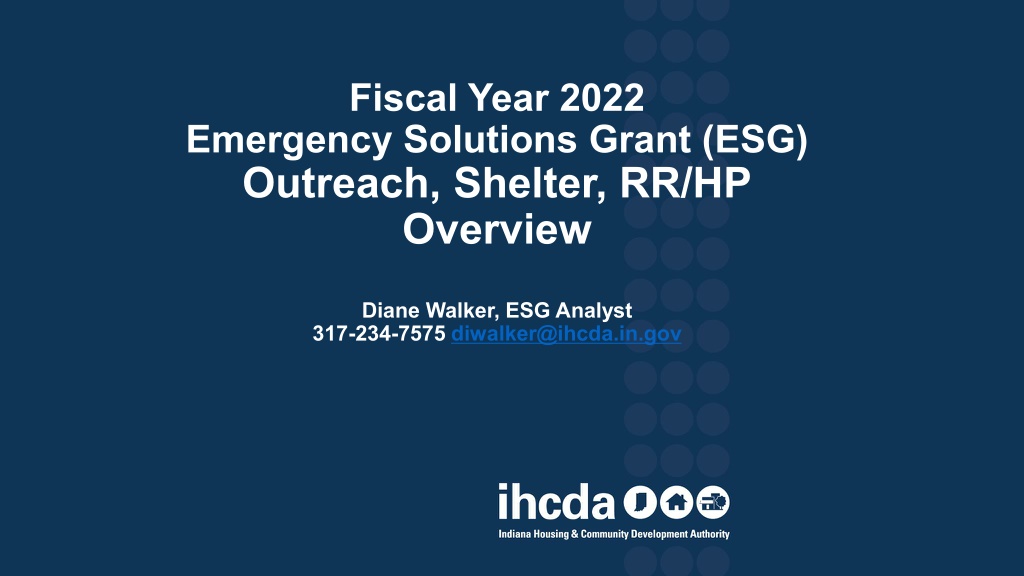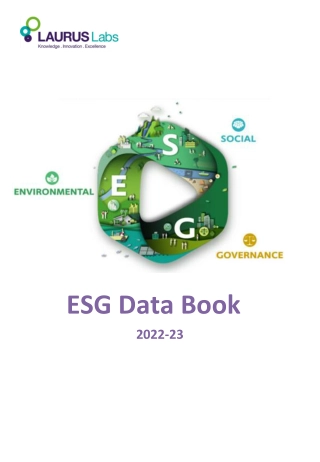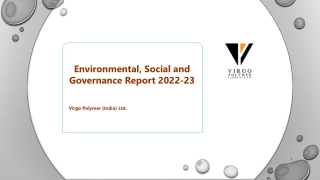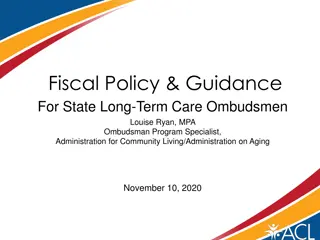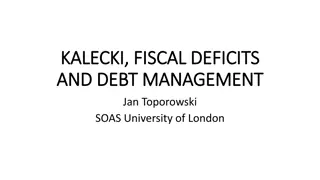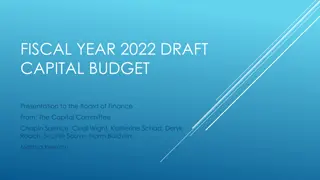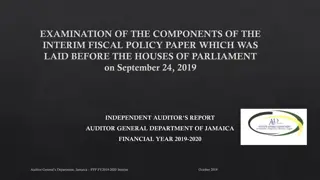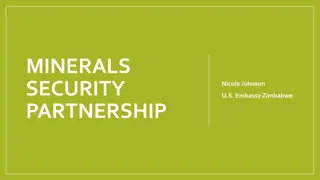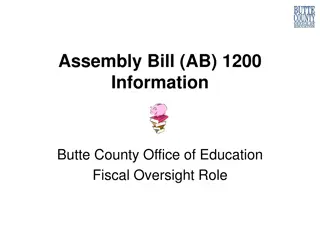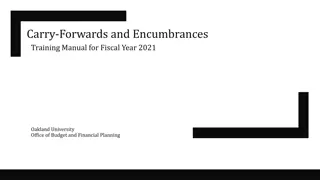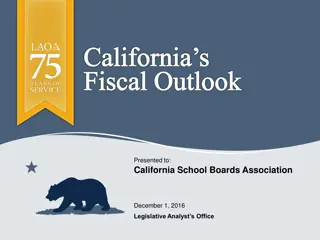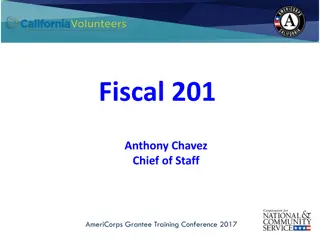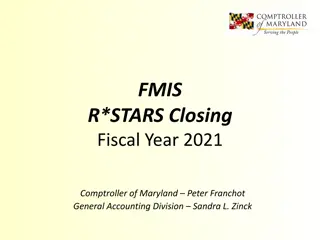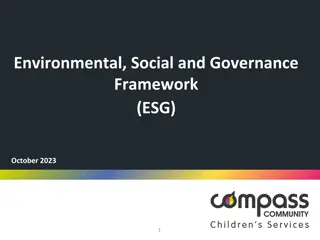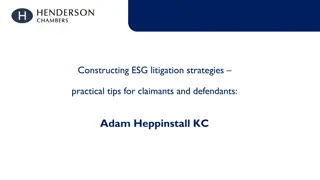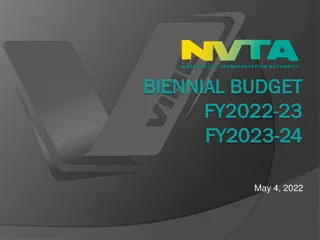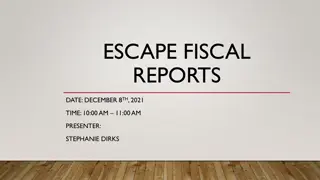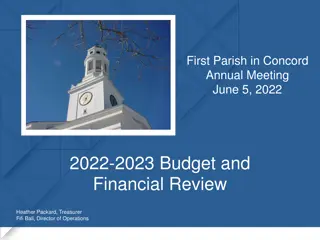Fiscal Year 2022 ESG Overview
This overview covers the Emergency Solutions Grant (ESG) for Fiscal Year 2022, including outreach, shelter, and rapid rehousing/homeless prevention programs. It includes information on compliance, monitoring, eligibility criteria, and documentation requirements for homeless households.
Download Presentation

Please find below an Image/Link to download the presentation.
The content on the website is provided AS IS for your information and personal use only. It may not be sold, licensed, or shared on other websites without obtaining consent from the author. Download presentation by click this link. If you encounter any issues during the download, it is possible that the publisher has removed the file from their server.
E N D
Presentation Transcript
Fiscal Year 2022 Emergency Solutions Grant (ESG) Outreach, Shelter, RR/HP Overview Diane Walker, ESG Analyst 317-234-7575 diwalker@ihcda.in.gov
AGENDA Compliance and Monitoring Street Outreach Emergency Shelter Short-term rental assistance included with Shelter award Rapid Rehousing Homeless Prevention Claims overview Questions
Homelessness Experience and Documentation Households who are eligible for Street Outreach services are experiencing unsheltered homelessness , staying in a place not meant for human habitation Category 1: Literally homeless (i) An individual or family with a primary nighttime residence that is a public or private space not designed for or ordinarily used as a regular sleeping accommodation for human beings, including a car, park, abandoned building, bus or train station, airport, or campground. Literal Homelessness: street outreach, shelter, and RRH need to align with HUD standards for accepting individuals and families experiencing literal homelessness (includes Category 1 & 4)
Eligibility Criteria: Rapid Re-Housing Category 4: Fleeing, or is attempting to flee domestic violence AND No subsequent residence has been identified AND No resources or support networks to obtain permanent housing Category 4: This is not a new homeless eligibility category, but it has been expanded to include people who are fleeing or attempting to flee domestic violence, as well as sexual assault, stalking or other dangerous or life- threatening situations related to violence.
Documenting homelessness & Imminent Risk RRHP Documentation Sources: (in order of preference) 3rdParty Written Verification notices/statements on letterhead, signed & dated 3rdParty Oral Verification recorded oral statement by intake staff, 3rd party providing verification, signed and dated by intake staff as true and complete Recommend standardized form for program Intake Observations intake staff notes observations & assessments, signed and dated by intake staff as true and complete Recommend standardized form for program Self Certification individual/head of household statement, written, signed and dated as true and complete. Okay for Criteria 4 category of homeless
Documentation of Homelessness The HUD Homeless Documentation form was created for use as a guide for proper documentation of homelessness. It is not required that this specific form be used, however it is required that it is documented from where the participant was referred, 3rdparty verification obtained when possible, and to have a space for client and staff signatures.
Terminating Assistance: Grievance Procedures To terminate rental assistance or housing relocation and stabilization services to a program participant, the required formal process, at a minimum, must consist of: (1) Written notice to the program participant containing a clear statement of the reasons for termination; (2) A review of the decision,(Appeals process) in which the program participant is given the opportunity to present written or oral objections before a person other than the person (or a subordinate of that person) who made or approved the termination decision; (3) Prompt written notice of the final decision to the program participant. (c) Ability to provide further assistance. Termination under this section does not bar the sub-recipient from providing further assistance at a later date to the same family or individual. IHCDA will not be involved in appeals
Homeless Management Information System (HMIS) and Coordinated Entry Secure, confidential Web-based data collection system that tracks data on the nature and extent of homelessness in your individual program(s), your community, and also statewide and nationally. Features of HMIS/ DV Client Track: User-friendly, customizable, easy to generate reports Case Management Tool: Can track employee hours, client goals, outcomes, and manage case loads Arizona Self-Sufficiency Matrix- built in vulnerability matrix to quantify clients progress over time ESG Shelters must participate in Coordinated Entry, HP does not have to participate in CE.
ESG Reporting Requirements-HMIS Sub-recipients that utilize Essential Services funds are required to document case notes and services in HMIS or DV Client Track for all program participants At this time, enter only ENROLLED/ELIGIBLE persons into HMIS for ESG RR & HP Program.
Domestic Violence Database Requirements Must have comparable system to HMIS system (collect same universal data elements, produce aggregate, client-level, unduplicated reports) DV Client Track is available to DV shelters who cannot meet the requirement with their current database. Contact the DV Client Track helpdesk at: dvhelpdesk@ihcda.in.gov for assistance.
Point in Time Count Participation Participation expectations: Update Housing Inventory Chart (HIC) form (November) Communicate and respond timely with PIT Coordinator and Regional Planning Council Chair requests Keep HMIS or Client Track Data up to date Fill out PIT surveys when applicable (DV providers not on Cient Track or as part of unsheltered count efforts) Pull PIT Report from HMIS/CT as required, check data carefully, send to appropriate IHCDA staff on time
Services for Special Populations Funds may be used to provide services for homeless youth, victim services, and services for people living with HIV/AIDS, so long as the costs of providing these services are eligible ESG Outreach activities (Engagement, Case Management, Medical/Mental Health Services or Transportation) The term victim services means services that assist program participants who are victims of domestic violence, dating violence, sexual assault, or stalking, including services offered by rape crisis centers and domestic violence shelters, and other organizations with a documented history of effective work concerning domestic violence, dating violence, sexual assault, or stalking
Record Retention Period of record retention: All records pertaining to each fiscal year of ESG funds must be retained for the greater of five(5) years following the end of the award period. Copies made by microfilming, photocopying, or similar methods may be substituted for the original records. Documentation of each program participant s qualification as a family or individual at risk of homelessness or as a homeless family or individual and other program participant records must be retained for 5 years after the expenditure of all funds from the grant under which the program participant was served
Budget Modifications and Amendments 1. Line Item: a) Sub-recipients can modify the amounts among line items within an activity for each type of award. There is no limit on the number of line item budget modifications that can be submitted throughout the award period. 2. Changing between activities: For RRH awards, changing budgets from what is listed in Exhibit B of Award Agreement (between activities). These must be approved by IHCDA. Maximum of one Budget Amendment is allowable per year. -Example: moving funds from RRH to HP or vice versa. IHCDA will need to make changes in HUD s accounting system and that is why they are required to be approved. It will delay payment if these steps are missed.
Award Monitoring 25% of programs are monitored each program year- 1sttime awardees must be monitored during the grant year. The IHCDA Monitoring Analyst will send the monitoring tool in advance. Programs will be contacted before monitoring visit with a minimum of two weeks advance notice. We are currently only completing desk-top monitors until further notice. Emphasis on compliance with federal requirements such as: o Client file review for case management and required documentation o Financial review including match reporting and claims o Utilization of Coordinated Entry and HMIS
ESG Outreach Program Requirements Funds can serve people experiencing category 1 homelessness only (HUD s definition of homeless) Document homeless status (use form) 100% match (must be documented) Keep accurate financial, service delivery records, should be retained for 5 years from the end of the award period Working e-mail and access to Internet, financial software Required to attend Award Trainings/Webinars Ensure Confidentiality! Never email us client names!! All of these requirements will be detailed in the ESG Outreach Award Manual
Engagement The cost of activities to locate, identify and build relationships with people who are unsheltered and engage them for the purpose of providing immediate support and connection to resources. Initial assessment Addressing urgent needs; meals, clothing, blankets, toiletries Active connection of information and referrals to resources and programs Examples: connection to assessment for Coordinated Entry System, emergency shelter, community-based services, rapid rehousing programs, etc.
Case Management The cost of assessing housing and service needs, arranging, coordinating, and monitoring the delivery of individualized services to meet the needs of the program participant Eligible services and activities are as follows: verifying and documenting eligibility; (homeless documentation form) counseling developing, securing and coordinating services obtaining Federal, State, and local benefits monitoring and evaluating program participant progress providing information and referrals to other providers developing an individualized housing and service plan, including planning a path to permanent housing stability
Emergency Health Services Eligible treatment consists of: assessing a program participant's health problems and developing a treatment plan assisting program participants to understand their health needs providing directly or assisting program participants to obtain appropriate emergency medical treatment providing medication and follow-up services ***Funds may be used only for these services to the extent that other appropriate health services are inaccessible or unavailable within the community Must have documentation.
Emergency Mental Health Services Eligible treatment consists of: assessing a program participant's health problems and developing a treatment plan assisting program participants to understand their health needs providing directly or assisting program participants to obtain appropriate emergency medical treatment providing medication and follow-up services ***Funds may be used only for these services to the extent that other appropriate mental health services are inaccessible or unavailable within the community Must have documentation.
Transportation The transportation costs of travel by outreach workers, social workers, medical professionals, or other service providers are eligible, provided that this travel takes place during the provision of ESG eligible services Eligible costs include: The cost of a program participant's travel on public transportation The cost of transporting a participant to emergency housing or other service facilities Mileage reimbursement when an employee s own vehicle is used The cost of purchasing or leasing a vehicle for the sub-recipient in which staff transports program participants and/or staff serving program participants, and the cost of gas, insurance, taxes and maintenance for the vehicle The travel costs program staff to accompany or assist program participants to use public transportation
ESG Shelter Program Requirements Funds can serve people experiencing category 1 and category 4 homelessness (HUD s definition of homeless) You must document homelessness! Age or gender of a child must not be used as a basis for denying shelter to a family HUD Equal Access Rule: LGBTQ+ or family make-up cannot bar access or impact shelter services 100% match (must be documented) Termination/Grievance Procedure Participation of Homeless Persons in organization to the extent possible Keep accurate financial, service delivery records, for 5 years following the end of the award period Working e-mail and access to Internet, financial software Non- domestic violence shelter must use HMIS, DV must use comparable database (we recommend DV ClientTrack) Must enter not just for ESG program, but all homeless programs in agency. Enter client data within 5 days of intake.
Eligible Activities-Essential Services Case management- salary of case manager working directly with shelter clients Child Care- payment to a licensed daycare center for child-care of shelter clients including providing meals, snacks, and activities Education Services- cost of books, instructional materials, literacy training Employment Assistance and Job Training- cost of job training programs; assistance in acquisition of vocational license and/or certificate Outpatient Health Services- outpatient Doctor examination, health screening, preventative medical care, medication, dental care
Eligible Activities-Essential Services Legal Services- hourly fees and legal advice from licensed attorneys; Life Skills Training- training budgeting resources, managing money, conflict resolution, shopping for food, etc. Mental Health Services- outpatient treatment by licensed professionals Substance Abuse Treatment Services- outpatient treatment for up to 30 days Transportation- travel to and from essential service activities-bus tokens, shelter vehicle Services for Special Populations-Otherwise eligible essential services tailored to address the special needs of homeless youth, victims of domestic violence and related crimes/threats, and people living with HIV/AIDS in emergency shelters.
Essential Services-Ineligible Activities Salaries of employees not working directly with clients Staff recruitment/training Training not sponsored by HUD Transportation costs not directly associated with service delivery Transportation-gas cards or filling client s car with gas Inpatient detoxification and other inpatient drug or alcohol treatment
Shelter Operations Eligible operating costs of the shelter building related to the provision of emergency housing including: Maintenance (minor or routine repairs), rent, security, fuel (for shelter not vehicle), equipment, insurance, utilities, food, furnishings, and supplies necessary for the operation of the emergency shelter Payment of short-term motel/hotel stays where no appropriate emergency shelter is available No more than 10% of each sub-recipient s total award can be utilized for operations staff salaries Excludes maintenance and security salary costs
Eligible Activities- Operations Maintenance: carpet cleaning in shelter rooms; fixing plumbing issue in shelter; salary of maintenance worker; killing bed bugs, etc. Rent: lease of shelter building Security: monthly cost of security system for shelter; software for computer security Utilities: gas or electric bill for shelter building
Eligible Activities- Operations Equipment: Purchasing new computers, printers, copy machines, microwave for shelter kitchen, etc. Insurance: shelter building insurance; auto insurance on shelter owned (or leased) vehicle used for shelter program Utilities: water and sewage costs of shelter building Food: food for shelter clients Furnishings: mattresses, beds, tables to furnish shelter rooms, etc. Supplies: office supplies used for the shelter program; cleaning supplies for the shelter building, etc.
Ineligible Activities- Operations Recruitment or ongoing staff training Depreciation Costs associated with the organization rather than the facility (ex: advertisements, pamphlets about organization, survey) Public Relations or fund raising Staff training, entertainment, conferences, retreats Bad debts/late fees Mortgage payments Vehicle Maintenance or Fuel (Would be included in transportation, not Admin)
Rental Assistance (RRH as part of Shelter Award) Housing relocation and stabilization services and short term, one-time financial assistance, as necessary, to help a homeless individual or family move as quickly as possible out of shelter system and into permanent housing and achieve stability in their own housing. Communities that have most successfully decreased the number of people experiencing homelessness have employed Rapid Re-housing programs as a central part of the solution. Directly reduces homelessness, frees up space in emergency shelter to be able to more effectively and rapidly triage people through emergency crisis center Helps your shelter program to get people into permanent housing quickly and thus reduce length of stay and be able to serve more people Population served: literally homeless only. Those in a shelter, place not meant for human habitation. No income requirements
Rental Assistance (RRH as part of Shelter Award) Financial Assistance (Short-term only) Security, Utility Deposits Utility Payments & Arrears Last Month s Rent Rental Application Fees Moving costs (truck rental, moving company, short term storage) Services (need to provide financial assistance or rental assistance to use) Housing Search & Placement Housing Stability Case Management Legal Services Credit Repair Rental Assistance (One time payment only) First Month s Rent (need to sign lease agreement w/ landlord) Rental Arrears (up to 6 months; sign form with landlord, tenant, proof of arrears)
Rental Assistance-Ineligible Activities Housing/services to persons who don t meet HUD s literal homelessness definition Direct payments to individuals needing assistance
Rapid Rehousing Program Model Access to Rapid Rehousing without Pre-Condition: No income requirement No criminal history thresholds No criteria related to rental/housing history Rental Subsidies available for up to 24 months in a 3 year period; based on household need Expand housing-focused Case Management
Required Documentation 1. Homeless Documentation utilize HUD Homeless Documentation Form or HMIS intake form 2. Coordinated Entry Assessment-VI-SPDAT 3. HMIS Intake 4. Arizona Self Sufficiency Matrix inside HMIS 5. Housing Plan in HMIS system 6. Housing Inspection Habitability Form 7. Lead Based Paint Inspection - signed acknowledgment of receipt of lead-based paint disclosures should be in client file. 8. Rent Reasonable check - Utilize Affordablehousing.com/formerly GoSection 8 Copy/print and place in file Contact ESG Analyst for log-in credentials for Affordablehousing.com/GoSection 8 Review Affordablehousing.com/GoSection 8 user manual *Rent cannot be over FMR utilize most up to date FMR
Required Documentation 9. Income information collected place in file Income calculation form Zero Income form 10. Utility Allowance- Only needed if utilities are not included in rent 11. Lease Agreement Forms RAP (rental assistance program contract) between tenant & sub- recipient; RAP between landlord & sub-recipient 12. Save a copy of the tenant s lease with the landlord in the file. 13. Provide agency termination policy & procedures and appeals process. - should have signed acknowledgement of receipt of policy. 14. Case Management required monthly. Utilize HMIS service case management for time spent with each household/person 15. Required VAWA Forms Forms 5380-5383. Forms will be sent after training.
Income Requirement for Rapid Re-housing There is no income threshold with Rapid Re-housing: Households with income, pay 30% of their adjusted gross income Households without income are not required to contribute financially to their rent until an increase in income occurs Complete the zero-income affidavit if a person enters the program without household income
Housing Relocation & Stabilization Services: Financial Assistance Costs ESG funds may be used to pay housing owners, utility companies, and other third parties for the following costs: (1) Rental application fees: ESG funds may pay for the rental housing application fee that is charged by the owner to all applicants (2) Security deposits: ESG funds may pay for a security deposit that is equal to no more than 2 months rent. (3) Last month s rent: If necessary to obtain housing for a program participant, the last month s rent may be paid from ESG funds to the owner of that housing at the time the owner is paid the security deposit and the first month s rent. This assistance must not exceed one month s rent and must be included in calculating the program participant s total rental assistance, which cannot exceed 24 months during any 3-year period. *1stmonth s rent is part of rental assistance activity
Housing Relocation & Stabilization Services: Financial Assistance Costs (4) Utility deposits: ESG funds may pay for a standard utility deposit required by the utility company for all customers. Deposits are limited to the allowable covered utilities as noted below. (5) Utility payments: ESG funds may pay for up to 24 months of utility payments per program participant, per service, including up to 6 months of utility payments in arrears, per service. A partial payment of a utility bill counts as one month. This assistance may only be provided if the program participant or a member of the same household has an account in his or her name with a utility company or proof of responsibility to make utility payments. Eligible utility services are gas, electric, water, and sewage. No program participant shall receive more than 24 months of utility assistance within any 3-year period.
Housing Relocation & Stabilization Services Financial Assistance (6) Moving costs: ESG funds may pay for moving costs, such as truck rental or hiring a moving company. This assistance may include payment of temporary storage fees for up to 3 months, provided that the fees are accrued after the date the program participant begins receiving assistance under paragraph (b) of this section and before the program participant moves into permanent housing. Payment of temporary storage fees in arrears is not eligible. Even though this is not rental assistance, a Housing Habitability has to be completed for the above financial assistance items. NOT required to review Rent Reasonableness nor be within HUD FMR because rental assistance was not provided Case Management is also required at least 1 x month while funds are being provided.
Housing Relocation & Stabilization Service Costs ESG funds may be used to pay the costs of providing the following services: (1)Housing search and placement: Services or activities necessary to assist program participants in locating, obtaining, and retaining suitable permanent housing, include the following: Assessment of housing barriers, needs, and preferences Development of an action plan for locating housing Housing search Outreach to and negotiation with landlords/owners Assistance with submitting rental applications and understanding leases Assessment of housing for compliance with Emergency Solutions Grant (ESG) Requirements for habitability, lead-based paint, and rent reasonableness Assistance with obtaining utilities and making moving arrangements Tenant counseling
Housing Relocation & Stabilization Service Costs (2) Housing Stability Case Management: ESG funds may be used to pay cost of assessing, arranging, coordinating, and monitoring the delivery of individualized services to facilitate housing stability for a program participant who resides in permanent housing or assist a program participant in overcoming immediate assistance cannot exceed 30 days during the period the program participant is seeking permanent housing and cannot exceed 18 months during the period the program participant is living in permanent housing.
Housing Stability Case Management - Activities Using the coordinated entry system to evaluate needs of households applying for or receiving homelessness prevention or rapid re-housing assistance Conducting the initial evaluation including verifying and documenting eligibility (getting 3rd party documentation of homelessness), for individuals and families applying for rapid re-housing assistance Counseling Developing, securing, and coordinating services and obtaining Federal, State, and local benefits Monitoring and evaluating program participant progress Providing information and referrals to other providers Developing an individualized housing and service plan, including planning a path to permanent housing stability Conducting re-evaluations as required in the new progressive engagement standards
Housing Stability Case Management Housing Stability Case Management-Activities: While providing RR or HP assistance to a program participant, the sub- recipient must: Meet with the participant at least once monthly to check in on housing related goals and insure the household can access support and resources as needed Develop a housing plan (utilize HMIS) to assist the program participant in finding and retaining permanent housing after the ESG assistance ends * The Arizona Matrix tool (in HMIS) can be a helpful tool to establish goals for the housing plan
Mainstream Resources & Housing Plan Connecting program participants to mainstream and other resources: Mainstream resources including but not limited to: Medicaid SNAP/Food Benefits WIC SSI/SSDI Childcare or public school Head Start Work One/Vocational Rehabilitation Food Banks/Meal Programs Hoosier Wise Insurance Health Clinic s Case Management required at least 1 time per month. Increase case management as indicated by the barriers noted in the Arizona Matrix Tool and focusing on those needs & goals in the housing plan. Adjust Housing Plan as needed.
Housing Relocation & Stabilization Service Costs Mediation: ESG funds may pay for mediation between the program participant and the owner or person(s) with whom the program participant is living, provided that the mediation is necessary to prevent the program participant from losing permanent housing in which the program participant currently resides. Legal services: Eligible subject matters also include landlord/tenant matters, and the services must be necessary to resolve a legal problem that prohibits the program participant from obtaining permanent housing or will likely result in the program participant losing the permanent housing in which the program participant currently resides. Credit repair: ESG funds may pay for credit counseling and other services necessary to assist program participants with critical skills related to household budgeting, managing money, accessing a free personal credit report, and resolving personal credit problems. This assistance does not include the payment or modification of a debt.
Services: Housing Habitability Minimum standards for permanent housing: Utilize Habitability form The recipient or sub-recipient cannot use ESG funds to help a program participant remain or move into housing that does not meet the minimum habitability standards: (1) Structure and materials (2) Space and security (3) Interior air quality (4) Water supply (5) Sanitary facilities (6) Thermal environment (7) Illumination and electricity (8) Food preparation (9) Sanitary conditions (10) Fire safety
